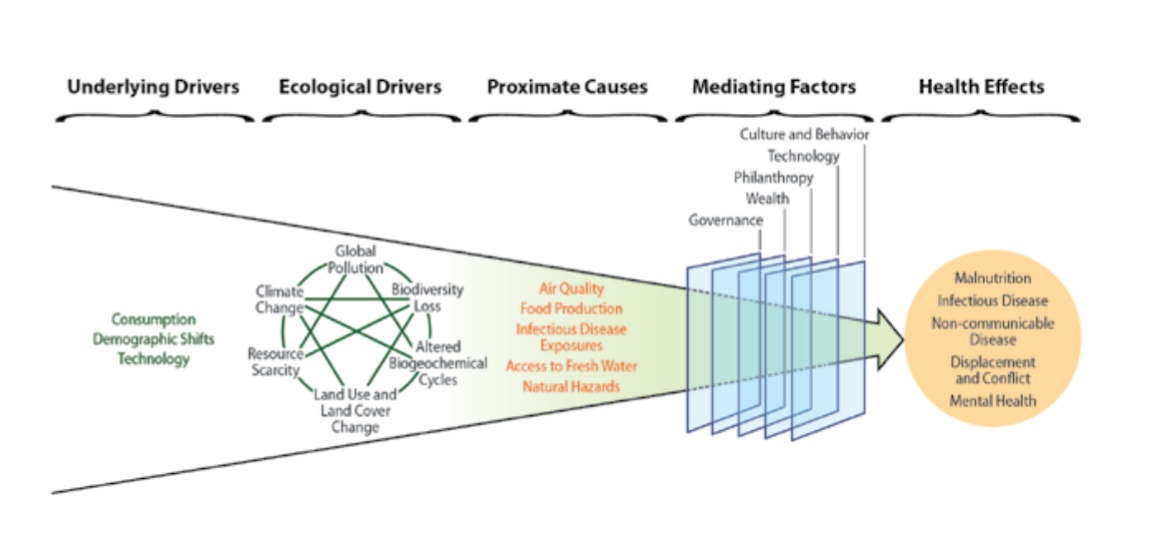Planetary Health: A framework for our times
Planetary Health: A framework for our times
On today, Earth Overshoot Day 2020, Sam Bickersteth introduces a new book about planetary health and explains why it provides a fitting framework for more effective government and corporate policy in our times.
The 2020 Earth Overshoot Day, the date at which humanity has exhausted nature’s budget for this year, falls on 22nd August as calculated by the Global Footprint Network. It may seem good news that reduced carbon emissions and forest loss has seen a 10% contraction global ecological footprint from 29th July in 2019 but it was only 50 years ago in 1970 that humanity first exceeded the earth’s annual carrying capacity indicating the extraordinary pace of demand on the earth’s resources.
Awareness that we are living beyond our environmental means at global level may never have been higher. Global environmental protests such as the School Strikes for Climate have been inspired by Greta Thunberg while at local level we have enjoyed the sound of song birds during the time of the COVID-19 lockdown. Both alert us to how the state of our planet is integral to our health and wellbeing.
Planetary health has emerged as a new integrated approach that seeks better understanding of intersection of global environmental changes and human health and well-being. Planetary Health has emerged from the awareness that human health is dependent on natural systems but the degradation of those systems, or erosion of critical natural capital, is increasingly harming health and wellbeing globally. Estimates of the number of deaths attributable to environmental factors vary from 20% to over 35% of global mortality but we know that the cost to society of deaths associated with air pollution, poor diet and nutrition, unsafe water is high. The global economic disruption and impact of COVID-19 has demonstrated how significant these costs can be.
Planetary Health: Protecting Nature to Protect Ourselves is a new book that summarises the state of knowledge and the interconnections between the range of global environmental changes, the driving forces behind them and the related risks to human health including non-communicable diseases, infectious diseases or mental health. Land use change, biodiversity loss and pollution all drivers for changes in human health but climate change, both directly and indirectly, increases the risk of almost every form of human suffering both now and into the future.
The COVID-19 pandemic is an archetypal planetary health problem as highlighted in this recently published volume. Most emerging infectious disease are zoonotic infections from wildlife and we know that COVID-19 emerged from wet animal markets in Asia. The global connectedness that linked the rest of the world so rapidly to the initial outbreak in Wuhan characterises the planet’s human and natural systems. Furthermore planetary health is a systems issue and the complex system aspects of the pandemic connecting health, economy, education and so much has impacted the majority of the global population. Complex systems have a tendency to mainstain stability but also a capacity for sudden shifts. This too has been a characteristic of COVID19 although many had warned of a possible virus and it can be seen as a predictable surprise. COVID-19, heat waves, other disasters and climate change all exacerbate inequalities. This has sadly played out in terms of COVID impacts on ethnicity, education and gender and in the financial response of governments.
The relationships between environmental changes and human health are mediated by a range of factors as illustrated in the figure (see below). Governance including economic systems and policies, technology and behaviour are all critical. We have long known that we cannot rely on markets and there is an urgent need to capture the true cost of environmental change to both people and the planet and internalise externalities. This requires non-market valuations (increasingly used in business and by governments) of the environment. Non-price based policies or regulatory instruments, mandates and bans will also be needed to incentivize individuals and businesses. New and existing tools from economics can be applied to planetary health. For example, new approaches to capitals that go beyond simply financial and manufactured capital to include natural, social and human capital, non-market valuations and insights from the emerging field of behavioural economics.
Planetary health, as so clearly illustrated in the weak and uncoordinated global response to the current pandemic, indicates that governance underpins solutions. The quality of our institutions, their leaders and cooperation to work on the transboundary environmental problems have never been greater. A coordinated UN and multilateral support to planetary health efforts linked to global, national, regional, and local levels alongside coalitions of forward thinking countries and networks of non-state actors will do much to take forward planetary health and manage future pandemics effectively and redress the imbalance in humanity’s impact on nature.
Planetary Health: Protecting Nature to Protect Ourselves is an edited volume from a wide range of authors that sets out these issues in the emerging field of Planetary Health in a major text for the first time. Will Evison and I contributed chapters on economics, governance and business related issues.
If you’d like to purchase a copy from Island Press, use the code PLANET for a 20% discount.
Diagram above: from the book, with authors' permission. Image above: Nepal, credit CIAT.

